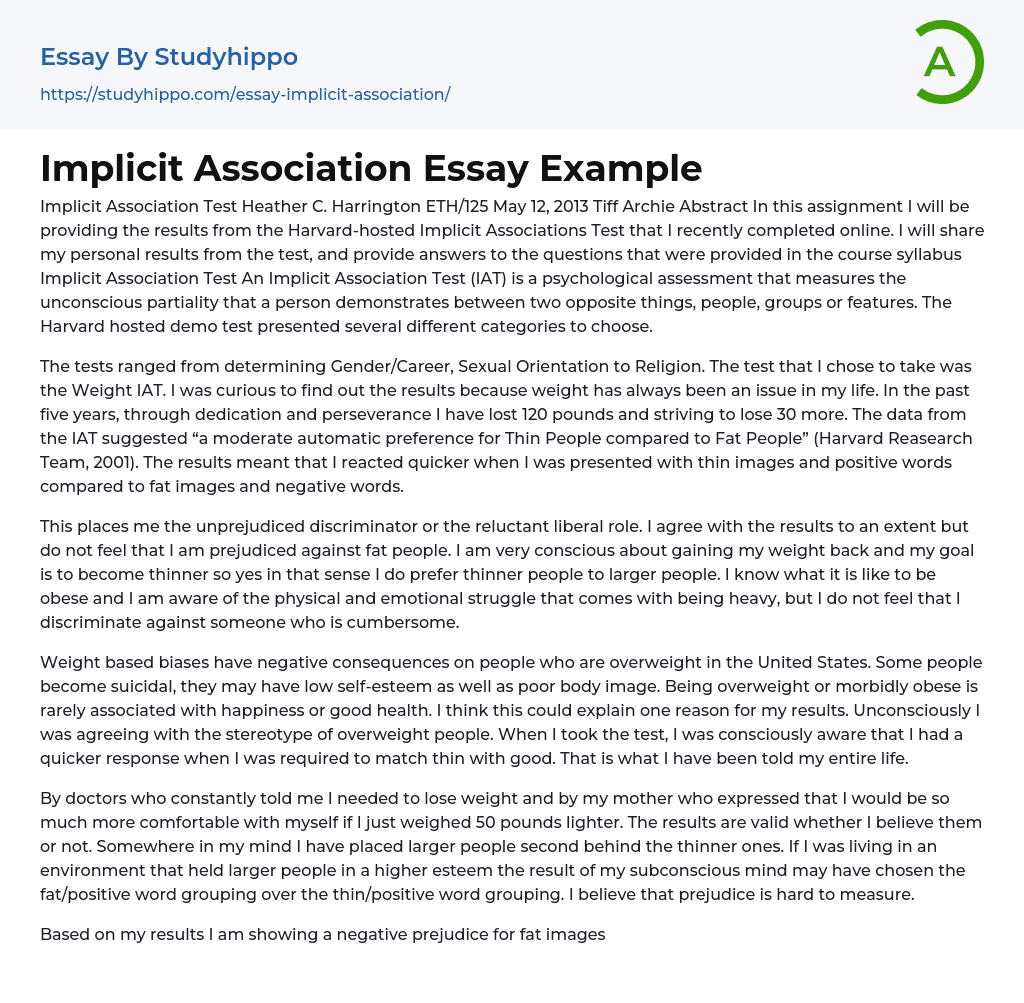In this assignment I will be providing the results from the Harvard-hosted Implicit Associations Test that I recently completed online. I will share my personal results from the test, and provide answers to the questions that were provided in the course syllabus Implicit Association Test An Implicit Association Test (IAT) is a psychological assessment that measures the unconscious partiality that a person demonstrates between two opposite things, people, groups or features. The Harvard hosted demo test presented several different categories to choose.
The tests ranged from determining Gender/Career, Sexual Orientation to Religion. The test that I chose to take was the Weight IAT. I was curious to find out the results because weight has always been an issue in my life. In the past f
...ive years, through dedication and perseverance I have lost 120 pounds and striving to lose 30 more. The data from the IAT suggested “a moderate automatic preference for Thin People compared to Fat People” (Harvard Reasearch Team, 2001). The results meant that I reacted quicker when I was presented with thin images and positive words compared to fat images and negative words.
This places me the unprejudiced discriminator or the reluctant liberal role. I agree with the results to an extent but do not feel that I am prejudiced against fat people. I am very conscious about gaining my weight back and my goal is to become thinner so yes in that sense I do prefer thinner people to larger people. I know what it is like to be obese and I am aware of the physical and emotional struggle that comes with being heavy, but
do not feel that I discriminate against someone who is cumbersome.
Weight based biases have negative consequences on people who are overweight in the United States. Some people become suicidal, they may have low self-esteem as well as poor body image. Being overweight or morbidly obese is rarely associated with happiness or good health. I think this could explain one reason for my results. Unconsciously I was agreeing with the stereotype of overweight people. When I took the test, I was consciously aware that I had a quicker response when I was required to match thin with good. That is what I have been told my entire life.
By doctors who constantly told me I needed to lose weight and by my mother who expressed that I would be so much more comfortable with myself if I just weighed 50 pounds lighter. The results are valid whether I believe them or not. Somewhere in my mind I have placed larger people second behind the thinner ones. If I was living in an environment that held larger people in a higher esteem the result of my subconscious mind may have chosen the fat/positive word grouping over the thin/positive word grouping. I believe that prejudice is hard to measure.
Based on my results I am showing a negative prejudice for fat images. But though I do not want to be overweight, does not mean that I do not like overweight people. I am an advocate for obesity and feel very compassionate when speaking about my past weight problem. I think it is also hard to measure because a person who is truly prejudice against
a group or individual may hide his feelings for the hatred against them.
References
- Harvard Research Team, (2011), Project Implicit, Retrieved from https://implicit. harvard. edu/implicit/demo/selectatest. html
- Anatomy and Physiology essays
- Addiction essays
- Biodegradation essays
- Dental Care essays
- Disease essays
- Disorders essays
- Health Care essays
- Intelligence Quotient essays
- Nutrition essays
- Olfaction essays
- Public Health essays
- Women's Health essays
- World health organization essays
- Cancer essays
- Infectious Disease essays
- Lung Cancer essays
- Neurology essays
- Physical Exercise essays
- Medicine essays
- Sex essays
- Inquiry essays
- Disability essays
- Poison essays
- Action Potential essays
- Nervous System essays
- Childbirth essays
- Puberty essays
- Blood essays
- Kidney essays
- Neuron essays
- Body essays
- Glucose essays
- Sense essays
- Heart essays
- Skeleton essays
- Human Physiology essays
- Eye essays
- Immune System essays
- Muscle essays
- Skin essays
- Brain essays
- Central Nervous System essays
- Human Skin Color essays
- Digestive System essays
- Common sense essays
- Respiration essays
- alcoholism essays
- Smoking essays
- Casino essays
- Tobacco essays




